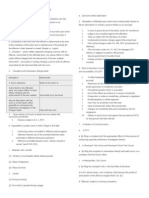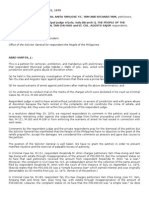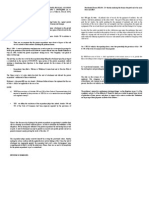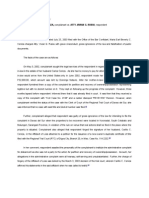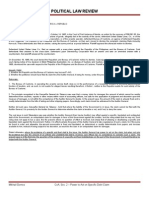0 ratings0% found this document useful (0 votes)
12 viewsAlmeda V Villaluz
Almeda V Villaluz
Uploaded by
jerushabrainerd1) The petitioner Leonardo Almeda was charged with qualified theft and sought release on bail. The trial court required a strictly cash bond, denying Almeda's request to post a surety bond.
2) The trial court has authority to set bail amounts and conditions. While a cash-only requirement denies the right to bail, the court may increase the bond amount or require periodic check-ins given the petitioner's criminal history.
3) The trial court permitted amendment of the information to include allegations of habitual delinquency after the petitioner's plea. Such amendments are allowed under the rules of court.
Copyright:
© All Rights Reserved
Available Formats
Download as DOC, PDF, TXT or read online from Scribd
Almeda V Villaluz
Almeda V Villaluz
Uploaded by
jerushabrainerd0 ratings0% found this document useful (0 votes)
12 views3 pages1) The petitioner Leonardo Almeda was charged with qualified theft and sought release on bail. The trial court required a strictly cash bond, denying Almeda's request to post a surety bond.
2) The trial court has authority to set bail amounts and conditions. While a cash-only requirement denies the right to bail, the court may increase the bond amount or require periodic check-ins given the petitioner's criminal history.
3) The trial court permitted amendment of the information to include allegations of habitual delinquency after the petitioner's plea. Such amendments are allowed under the rules of court.
Original Title
Almeda v Villaluz
Copyright
© © All Rights Reserved
Available Formats
DOC, PDF, TXT or read online from Scribd
Share this document
Did you find this document useful?
Is this content inappropriate?
1) The petitioner Leonardo Almeda was charged with qualified theft and sought release on bail. The trial court required a strictly cash bond, denying Almeda's request to post a surety bond.
2) The trial court has authority to set bail amounts and conditions. While a cash-only requirement denies the right to bail, the court may increase the bond amount or require periodic check-ins given the petitioner's criminal history.
3) The trial court permitted amendment of the information to include allegations of habitual delinquency after the petitioner's plea. Such amendments are allowed under the rules of court.
Copyright:
© All Rights Reserved
Available Formats
Download as DOC, PDF, TXT or read online from Scribd
Download as doc, pdf, or txt
0 ratings0% found this document useful (0 votes)
12 views3 pagesAlmeda V Villaluz
Almeda V Villaluz
Uploaded by
jerushabrainerd1) The petitioner Leonardo Almeda was charged with qualified theft and sought release on bail. The trial court required a strictly cash bond, denying Almeda's request to post a surety bond.
2) The trial court has authority to set bail amounts and conditions. While a cash-only requirement denies the right to bail, the court may increase the bond amount or require periodic check-ins given the petitioner's criminal history.
3) The trial court permitted amendment of the information to include allegations of habitual delinquency after the petitioner's plea. Such amendments are allowed under the rules of court.
Copyright:
© All Rights Reserved
Available Formats
Download as DOC, PDF, TXT or read online from Scribd
Download as doc, pdf, or txt
You are on page 1of 3
G.R. No.
L-31665 August 6, 1975
LEONARDO ALMEDA, petitioner,
vs.
HON. ONOFRE A. VILLALUZ, i !is "#$#"it% #s $&'si(ig )u(g' o* t!' +i&"uit
+&i,i#- +ou&t, .'/'t! 0u(i"i#- Dist&i"t, 1#sig, Ri2#-, #( HON. GREGORIO
1INEDA, +it% Fis"#- o* 1#s#% +it%, respondents.
Honorio Makalintal, Jr. for petitioner.
Pasay City Fiscal Gregorio Pineda for respondent.
+A.3RO, J.:
The petitioner Leonardo Almeda (alias Nardong Paa) was charged, together with five
others, with the crime of qualified theft of a motor vehicle (criminal case 2!"Pasa#) in the
$ircuit $riminal $ourt of Pasig, %i&al, presided '# the respondent (udge )nofre *illau&.
The amount of the 'ond recommended for the provisional release of Almeda was
P+!,,,,, and this was approved '# the respondent -udge with a direction that it 'e posted
entirel# in cash.
At the hearing of .e'ruar# +, +/0,, Almeda as1ed the trial court to allow him to post a
suret# 'ond in lieu of the cash 'ond required of him. This request was denied, and so was
an oral motion for reconsideration, on the ground that the amended information imputed
ha'itual delinquenc# and recidivism on the part of Almeda.
At the same hearing, the respondent cit# fiscal, thru his assistant, reiterated his oral
motion made at a previous hearing for amendment of the information so as to include
allegations of recidivism and ha'itual delinquenc# in the particular case of Almeda. The
latter vigorousl# o'-ected, arguing that (a) such an amendment was premature since no
copies of prior conviction could #et 'e presented in court, (') the motion to amend should
have 'een made in writing in order to ena'le him to o'-ect formall#, and (c) the proposed
amendment would place him in dou'le -eopard# considering that he had alread# pleaded
not guilt# to the information. The trial court nevertheless granted the respondent fiscal2s
motion in open court. An oral motion for reconsideration was denied.
3mmediatel# thereafter, the assistant fiscal too1 hold of the original information and, then
and there, entered his amendment '# annotating the same on the 'ac1 of the document.
The petitioner forthwith moved for the dismissal of the charge on the ground of dou'le
-eopard#, 'ut this motion and a motion for reconsideration were denied in open court.
4ence, the present special civil action for certiorari with preliminar# in-unction.
Two issues are posed to us for resolution5 .irst, whether the respondent -udge has the
authorit# to require a strictl# cash 'ond and disallow the petitioner2s attempt to post a
suret# 'ond for his provisional li'ert#, and second, whether the amendment to the
information, after a plea of not guilt# thereto, was properl# allowed in 'oth su'stance and
procedure.
1. As defined '# section + of %ule ++6 of the %ules of $ourt, 'ail is 7the securit# required
and given for the release of a person who is in the custod# of the law, that he will appear
'efore an# court in which his appearance ma# 'e required as stipulated in the 'ail 'ond or
recogni&ance.7 The purpose of requiring 'ail is to relieve an accused from imprisonment
until his conviction and #et secure his appearance at the trial.
1
3n this -urisdiction, the accused, as of right, is entitled to 'ail prior to conviction e8cept
when he is charged with a capital offense and the evidence of guilt is strong. This right is
guaranteed '# the $onstitution,
4
and ma# not 'e denied even where the accused has
previousl# escaped detention,
3
or '# reason of his prior a'sconding.
5
3n order to
safeguard the right of an accused to 'ail, the $onstitution further provides that 7e8cessive
'ail shall not 'e required.7 This is logical cause the imposition of an unreasona'le 'ail
ma# negate the ver# right itself. 9e have thus held that 7where conditions imposed upon a
defendant see1ing 'ail would amount to a refusal thereof and render nugator# the
constitutional right to 'ail, we would not hesitate to e8ercise our supervisor# powers to
provide the required remed#.7
5
$oming to the issue at hand, the amount fi8ed for 'ail, while reasona'le if considered in
terms of suret# or propert# 'onds, ma# 'e e8cessive if demanded in the form of cash. A
suret# or propert# 'ond does not require an actual financial outla# on the part of the
'ondsman or the propert# owner, and in the case of the 'ondsman the 'ond ma# 'e
o'tained '# the accused upon the pa#ment of a relativel# small premium. )nl# the
reputation or credit standing of the 'ondsman or the e8pectanc# of the price at which the
propert# can 'e sold, is placed in the hands of the court to guarantee the production of the
'od# of the accused at the various proceedings leading to his conviction or acquittal.
:pon the other hand, the posting of a cash 'ond would entail a transfer of assets into the
possession of the court, and its procurement could wor1 untold hardship on the part of the
accused as to have the effect of altogether den#ing him his constitutional right to 'ail.
Aside from the foregoing, the condition that the accused ma# have provisional li'ert# only
upon his posting of a cash 'ond is a'horrent to the nature of 'ail and transgresses our
law on the matter. The sole purpose of 'ail is to insure the attendance of the accused
when required '# the court, and there should 'e no suggestion of penalt# on the part of
the accused nor revenue on the part of the government. The allowance of a cash 'ond in
lieu of sureties is authori&ed in this -urisdiction onl# 'ecause our rules e8pressl# provide
for it. 9ere this not the case, the posting of 'ail '# depositing cash with the court cannot
'e countenanced 'ecause, strictl# spea1ing, the ver# nature of 'ail presupposes the
attendance of sureties to whom the 'od# of the prisoner can 'e delivered.
6
And even
where cash 'ail is allowed, the option to deposit cash in lieu of a suret# 'ond primaril#
'elongs to the accused. This is clearl# deduci'le from the language of section +6 of %ule
++6 of the %ules of $ourt5
;<$. +6. Deposit of money as bail. = At an# time after the amount of
'ail is fi8ed '# order, the defendant, instead of giving 'ail, ma# deposit
with the nearest collector of internal revenue, or provincial, cit#, or
municipal treasurer the sum mentioned in the order, and upon delivering
to the court a proper certificate of the deposit, must 'e discharged from
custod#. >one# thus deposited, shall 'e applied to the pa#ment of the
fine and costs for which -udgment ma# 'e given? and the surplus, if an#,
shall 'e returned to the defendant.
Thus, the trial court ma# not re-ect otherwise accepta'le sureties and insist that the
accused o'tain his provisional li'ert# onl# thru a cash 'ond.
@ut while we repudiate the particular measure adopted '# the respondent -udge, we
cannot fault the motive that caused him to demur to the petitioner2s offer of a suret# 'ond.
@ased on the petitioner2s past record,
7
the range of his career in crime weighs heavil#
against letting him off easil# on a middling amount of 'ail. The li1elihood of his -umping
'ail or committing other harm to the citi&enr# while on provisional li'ert# is a consideration
that simpl# cannot 'e ignored.
.ortunatel#, the court is not without devices with which to meet the situation. First, it could
increase the amount of the 'ail 'ond to an appropriate level. ;econd, as part of the power
of the court over the person of the accused and for the purpose of discouraging li1el#
commission of other crimes '# a notorious defendant while on provisional li'ert#, the latter
could 'e required, as one of the conditions of his 'ail 'ond, to report in person periodicall#
to the court and ma1e an accounting of his movements. And third, the accused might 'e
warned, though this warning is not essential to the requirements of due process, that
under the +/0A $onstitution
6
7Trial ma# proceed notwithstanding his a'sence provided
that he has 'een dul# notified and his failure to appear is un-ustified.7
9ith respect to the amount of the 'ail 'ond, the trial court is well advised to consider, inter
alia, the following factors, where applica'le5 (+) the a'ilit# of the accused to give 'ail5 (2)
the nature of the offense? (A) the penalt# for the offense charged? (6) the character and
reputation of the accused (!) the health of the accused? (B) the character and strength of
the evidence? (0) the pro'a'ilit# of the accused2s appearance or non"appearance at the
trial? () forfeiture of previous 'onds? (/) whether the accused was a fugitive from -ustice
when arrested? and (+,) whether the accused is under 'ond for appearance at trial in
other cases. 9
3t is not amiss, at this point, to remind all courts to e8ercise e8treme care and caution in
the screening of 'ondsmen and sureties in regard to their reputation, solvenc# and
promptitude. Aside from the other precautions hitherto considered useful courts should
see to it that all suret# 'onds are accompanied '# corresponding clearances from the
)ffice of the 3nsurance $ommissioner. @ondsmen who cannot ma1e good their
underta1ing render inutile all efforts at ma1ing the 'ail s#stem wor1 in this -urisdiction.
2. Anent the second issue posed '# the petitioner, the amendment of the information to
include allegations of ha'itual delinquenc# and recidivism, after a previous plea thereto '#
the accused, is valid and in no wa# violates his right to 'e full# apprised 'efore trial of the
charges against him.
:nder section +A of %ule ++, of the %ules of $ourt, the trial court has discretion to allow
amendments to the information on all matters of form after the defendant has pleaded and
during the trial when the same can 'e done without pre-udice to the rights of the
defendant. 9hat are prohi'ited at this stage of the proceedings are amendments in
su'stance. And the su'stantial matter in a complaint or information is the recital of facts
constituting the offense charged and determinative of the -urisdiction of the court. All other
matters are merel# of form.
17
:nder our law, a person is considered a ha'itual delinquent 7if within a period of ten #ears
from the date of his release or last conviction of the crimes of serious or less serious
ph#sical in-uries, robo, !rto, estafa or falsification, he is found guilt# of an# of said crimes
a third time or oftener.7
11
The law imposes an additional penalt# 'ased on the criminal
propensit# of the accused apart from that provided '# law for the last crime of which he is
found guilt#. 4a'itual delinquenc# is not however, a crime in itself, it is onl# a factor in
determining a total penalt#.
14
Article B2 of the %evised Penal $ode which treats of
ha'itual delinquenc# does not esta'lish a new crime, 'ut onl# regulates the 7effect of the
attendance of mitigating or aggravating circumstances and of abit!al delin"!ency.7 as its
caption indicates. 3n fact, the provision on ha'itual delinquenc# is found in a section of the
$ode prescri'ing rules for the application of penalties, not in a section defining offense.
13
A recidivist, upon the other hand, is one who, at the time of his trial for one crime, shall
have 'een previousl# convicted '# final -udgment of another crime em'raced in the same
title of the %evised Penal $ode. %ecidivism is li1ewise not a criminal offense? it is 'ut one
of the aggravating circumstances enumerated '# the said $ode.
15
The additional allegations of ha'itual delinquenc# and recidivism do not have the effect of
charging another offense different or distinct from the charge of qualified theft (of a motor
vehicle) contained in the information. Neither do the# tend to correct an# defect in the
-urisdiction of the trial court over the su'-ect"matter of the case. The said new allegations
relate onl# to the range of the penalt# that the court might impose in the event of
conviction. The# do not alter the prosecution2s theor# of the case nor possi'l# pre-udice
the form of defense the accused has or will assume. $onsequentl#, in authori&ing the
amendments, the respondent -udge acted with due consideration of the petitioner2s rights
and did not a'use his discretion.
Anent the petitioner2s claim that the amendment of the information '# the ;tate places him
in dou'le -eopard#, it should 'e remem'ered that there is dou'le -eopard# onl# when all
the following requisites o'tain in the original prosecution? (a) a valid complaint or
information? (') a competent court? (c) the defendant had pleaded to the charge? and (d)
the defendant was acquitted, or convicted, or the case against him was dismissed or
otherwise terminated without his consent.
15
3t is clear that the petitioner Almeda has not #et 'een convicted nor acquitted of the
charge of qualified theft of a motor vehicle contained in the original information. Neither
has the case against him 'een dismissed or otherwise terminated. The mere amendment
of the information to include allegations of ha'itual delinquenc# and recidivism does not
have the effect of a dismissal of the criminal action for qualified theft alleged in the original
information.
16
3t cannot li1ewise 'e said that the accused is 'eing placed in -eopard# a second time for
the past crimes of which he had 'een convicted. The constitutional o'-ection, on the
ground of dou'le -eopard#, to the statute providing an additional penalt# to 'e meted out
to ha'itual delinquents, has long 'een re-ected.
17
The procedure ta1en '# the respondent fiscal and allowed '# the respondent -udge in the
amendment of the information does not, however, merit our appro'ation. :nder section 2
of %ule +! of the %ules of $ourt, 7all motions shall 'e made in writing e8cept motions for
continuance made in the presence of the adverse part#, or those made in the course of a
hearing or trial.7 A motion to amend the information, after the accused has pleaded
thereto, is certainl# one that should 'e placed in writing and properl# set for hearing. 9e
are loath to give our imprimatur to the 1ind of shortcut devised '# the respondents,
especiall# as it relates to an alteration in the information. $onsidering, however, that the
petitioner was not deprived of his da# in court and was in fact given advance warning of
the proposed amendment, although orall#, we refrain from distur'ing the said amendment.
A$$)%C3NDLE, the order of the respondent -udge of .e'ruar# +, +/0, den#ing the
motion of the petitioner Almeda that he 'e allowed to post a suret# 'ond instead of a cash
'ond is here'# set aside, without pre-udice, however, to increasing the amount of the 'ail
'ond andFor the imposition of such conditions as the respondent -udge might consider
desira'le and proper for the purpose of insuring the attendance of the petitioner at the
trial, provided the# are consistent with the views herein e8pressed. No costs.
Makasiar, #sg!erra, M!$o% Palma and Martin, JJ., conc!r.
&eeankee, J., is on lea'e.
You might also like
- Motions, Affidavits, Answers, and Commercial Liens - The Book of Effective Sample DocumentsFrom EverandMotions, Affidavits, Answers, and Commercial Liens - The Book of Effective Sample DocumentsRating: 4.5 out of 5 stars4.5/5 (17)
- Dishonour of Cheques in India: A Guide along with Model Drafts of Notices and ComplaintFrom EverandDishonour of Cheques in India: A Guide along with Model Drafts of Notices and ComplaintRating: 4 out of 5 stars4/5 (1)
- Almeda vs. VillaluzDocument5 pagesAlmeda vs. VillaluzadonaiaslaronaNo ratings yet
- Almeda V VillaluzDocument11 pagesAlmeda V VillaluzJennyMariedeLeonNo ratings yet
- Honorio Makalintal, Jr. For Petitioner. Pasay City Fiscal Gregorio Pineda For RespondentDocument4 pagesHonorio Makalintal, Jr. For Petitioner. Pasay City Fiscal Gregorio Pineda For RespondentHv EstokNo ratings yet
- Almeda v. Villaluz G.R. No. L-31665 August 6, 1975Document6 pagesAlmeda v. Villaluz G.R. No. L-31665 August 6, 1975Gail FernandezNo ratings yet
- Almeda Vs VilaluzDocument4 pagesAlmeda Vs VilaluzBernadetteNo ratings yet
- Laurel Notes RemedialDocument20 pagesLaurel Notes RemedialAnne YuchNo ratings yet
- Almeda vs. VillaluzDocument4 pagesAlmeda vs. VillaluzFrancess PiloneoNo ratings yet
- Honorio Makalintal, Jr. For Petitioner. Pasay City Fiscal Gregorio Pineda For RespondentDocument4 pagesHonorio Makalintal, Jr. For Petitioner. Pasay City Fiscal Gregorio Pineda For RespondentJane CuizonNo ratings yet
- Crim DigestDocument4 pagesCrim DigestIrish M. DiosomitoNo ratings yet
- Criminal ProcedureDocument28 pagesCriminal ProcedureArlando G. ArlandoNo ratings yet
- Rule 114-2 Almeda Vs VillaluzDocument2 pagesRule 114-2 Almeda Vs VillaluzjoiNo ratings yet
- Rule 114 2 Almeda Vs VillaluzDocument2 pagesRule 114 2 Almeda Vs VillaluzgheljoshNo ratings yet
- Almeda vs. Villaluz (GR L-31665, 6 August 1975)Document3 pagesAlmeda vs. Villaluz (GR L-31665, 6 August 1975)Joycee ArmilloNo ratings yet
- Criminal Procedure 000Document12 pagesCriminal Procedure 000Beyond GodlikeNo ratings yet
- Bpi vs. CA 512 Scra 620Document13 pagesBpi vs. CA 512 Scra 620rudyblaze187No ratings yet
- Breva & Breva Law Offices For Petitioner. Goc-Ong & Associates For Private RespondentsDocument5 pagesBreva & Breva Law Offices For Petitioner. Goc-Ong & Associates For Private RespondentsmasterlazarusNo ratings yet
- Almeda vs. Villaluz Lacking Case DigestDocument5 pagesAlmeda vs. Villaluz Lacking Case DigestgheljoshNo ratings yet
- Wack Wack Golf & Country Club, Inc.,: JudicataDocument14 pagesWack Wack Golf & Country Club, Inc.,: JudicataMara Corteza San PedroNo ratings yet
- For Criminal Procedure - MidtermDocument9 pagesFor Criminal Procedure - MidtermXeem LeenNo ratings yet
- Isip V People-Full TextDocument17 pagesIsip V People-Full TextAnjoNo ratings yet
- Rule 112 DigestDocument8 pagesRule 112 DigestRufino Gerard MorenoNo ratings yet
- Rule 117 & 118Document9 pagesRule 117 & 118Joseph Denila LagunaNo ratings yet
- 3 Peza V AlikpalaDocument2 pages3 Peza V AlikpalaMiggy CardenasNo ratings yet
- Almeda v. VillaluzDocument3 pagesAlmeda v. Villaluzsjblora100% (1)
- Metropolitan Bank and Trust Company, Petitioner, vs. ROGELIO REYNADO and JOSE C. Adrandea, RespondentsDocument21 pagesMetropolitan Bank and Trust Company, Petitioner, vs. ROGELIO REYNADO and JOSE C. Adrandea, Respondentsshienna baccayNo ratings yet
- Manzanares V Moreta - Case Digest - Moses RiveraDocument5 pagesManzanares V Moreta - Case Digest - Moses RiveraMoses RiveraNo ratings yet
- Cognizance A Birds Eye View RRJDocument11 pagesCognizance A Birds Eye View RRJdoytovskyNo ratings yet
- Chee Kiong Yam vs. MalikDocument3 pagesChee Kiong Yam vs. MalikDenise Jane DuenasNo ratings yet
- G.R. No. 164317 - Ching v. Secretary of JusticeDocument33 pagesG.R. No. 164317 - Ching v. Secretary of JusticePatrick D GuetaNo ratings yet
- Judgment) Awarding The Plaintiff Class A Total of One Billion Nine Hundred Sixty Four Million Five Thousand Eight HundredDocument8 pagesJudgment) Awarding The Plaintiff Class A Total of One Billion Nine Hundred Sixty Four Million Five Thousand Eight HundredMan HernandoNo ratings yet
- Legal Ethics Updates: Although The Cases Are Not RelatedDocument9 pagesLegal Ethics Updates: Although The Cases Are Not RelatedTimOty CocjinNo ratings yet
- People of The Philippines v. Victoria Arambulo and Miguelarambulo, Jr. G.R. No. 186597 June 17, 2015Document3 pagesPeople of The Philippines v. Victoria Arambulo and Miguelarambulo, Jr. G.R. No. 186597 June 17, 2015Franchesca RevelloNo ratings yet
- Lee Vs Rodil FullDocument4 pagesLee Vs Rodil FulljorisdyNo ratings yet
- BP 22 Bouncing Checks LawDocument4 pagesBP 22 Bouncing Checks LawLe Obm SizzlingNo ratings yet
- Orcino vs. GasparDocument3 pagesOrcino vs. GasparPaulo Miguel GernaleNo ratings yet
- Consolidated Bank Vs CADocument9 pagesConsolidated Bank Vs CANicoleAngeliqueNo ratings yet
- People v. PuigDocument9 pagesPeople v. PuigClark Edward Runes UyticoNo ratings yet
- 14 PAL v. CADocument4 pages14 PAL v. CArNo ratings yet
- BAIL - Digested CasesDocument9 pagesBAIL - Digested Casesto be the greatestNo ratings yet
- Us VS Catolico 18 Phil 504Document3 pagesUs VS Catolico 18 Phil 504AMTNo ratings yet
- DP Lub Oil Vs NicolasDocument2 pagesDP Lub Oil Vs Nicolasminri721No ratings yet
- Sarmiento Vs CA - G.R. No. 122502. December 27, 2002Document7 pagesSarmiento Vs CA - G.R. No. 122502. December 27, 2002Ebbe DyNo ratings yet
- Trial Tech (Cases)Document14 pagesTrial Tech (Cases)Rehina Mae MagtutoNo ratings yet
- HURL Cases 1Document27 pagesHURL Cases 1Zan BillonesNo ratings yet
- Presidential Anti-Dollar Salting Task Force vs. Court of AppealsDocument12 pagesPresidential Anti-Dollar Salting Task Force vs. Court of Appealsvanessa_3No ratings yet
- Santos Vs SibugDocument5 pagesSantos Vs Sibugmamp05No ratings yet
- Remedial Law (Criminal Procedure) Memory Aid A C B O 2001Document32 pagesRemedial Law (Criminal Procedure) Memory Aid A C B O 2001Jeshuah GenttelNo ratings yet
- Chester de Joya V Judge Placido Marquez, G.R. No. 162416 - January 31, 2006Document3 pagesChester de Joya V Judge Placido Marquez, G.R. No. 162416 - January 31, 2006ademarNo ratings yet
- Ceniza vs. RubiaDocument6 pagesCeniza vs. RubiaPaulo Miguel GernaleNo ratings yet
- 19 ICNA v. RepublicDocument1 page19 ICNA v. RepublicDexter LedesmaNo ratings yet
- Asprec V ItchonDocument7 pagesAsprec V ItchonChad OsorioNo ratings yet
- Hao vs. PeopleDocument16 pagesHao vs. PeopleMrln VloriaNo ratings yet
- Plaintiff-Appellee Vs Vs Defendant-Appellant B. Pobre Acting Attorney-General HarveyDocument4 pagesPlaintiff-Appellee Vs Vs Defendant-Appellant B. Pobre Acting Attorney-General HarveySamanthaNo ratings yet
- Remedial Law (Criminal Procedure) Memory Aid A C B O 2001Document32 pagesRemedial Law (Criminal Procedure) Memory Aid A C B O 2001Jose Maria Jude DuremdesNo ratings yet
- Philippine National Bank Vs Benito Seeto091 Phil 756Document4 pagesPhilippine National Bank Vs Benito Seeto091 Phil 756andrea ibanezNo ratings yet
- Constitution of the State of Minnesota — 1964 VersionFrom EverandConstitution of the State of Minnesota — 1964 VersionNo ratings yet
- Constitution of the State of Minnesota — 1960 VersionFrom EverandConstitution of the State of Minnesota — 1960 VersionNo ratings yet
- 1989 Labor Bar ExaminationDocument13 pages1989 Labor Bar ExaminationjerushabrainerdNo ratings yet
- Taxicab Operators v. The Board of Transportation (GR L-59234, 30 September 1982) DigestsDocument1 pageTaxicab Operators v. The Board of Transportation (GR L-59234, 30 September 1982) DigestsjerushabrainerdNo ratings yet
- 1990 Bar Examination - MercantileDocument11 pages1990 Bar Examination - MercantilejerushabrainerdNo ratings yet
- 1988 Labor Bar ExaminationDocument18 pages1988 Labor Bar ExaminationjerushabrainerdNo ratings yet
- 1986 Bar Examination - MercantileDocument12 pages1986 Bar Examination - MercantilejerushabrainerdNo ratings yet
- 1987 Labor Bar ExaminationDocument18 pages1987 Labor Bar ExaminationjerushabrainerdNo ratings yet
- 1989 Bar Examination - MercantileDocument13 pages1989 Bar Examination - MercantilejerushabrainerdNo ratings yet
- 1988 Bar Examination - MercantileDocument15 pages1988 Bar Examination - MercantilejerushabrainerdNo ratings yet
- Cuenca v. Atas, G.R. No. 146214, October 5, 2007, 535 SCRA 48 DigestDocument2 pagesCuenca v. Atas, G.R. No. 146214, October 5, 2007, 535 SCRA 48 DigestjerushabrainerdNo ratings yet
- Buenaseda vs. Flavier G.R. No. 106719 (226 SCRA 649, 21 September 1993)Document4 pagesBuenaseda vs. Flavier G.R. No. 106719 (226 SCRA 649, 21 September 1993)jerushabrainerdNo ratings yet
- Benchbook For Trial Court Judges: (Evidence)Document19 pagesBenchbook For Trial Court Judges: (Evidence)jerushabrainerdNo ratings yet
- Amaya vs. TecsonDocument4 pagesAmaya vs. TecsonjerushabrainerdNo ratings yet
- Aquino vs. MangaoangDocument1 pageAquino vs. MangaoangjerushabrainerdNo ratings yet
- Basco V RapataloDocument8 pagesBasco V RapatalojerushabrainerdNo ratings yet
- Alcoriza Vs LumakangDocument3 pagesAlcoriza Vs LumakangjerushabrainerdNo ratings yet
- Pascua V CADocument4 pagesPascua V CAjerushabrainerdNo ratings yet
- Stonehill V DioknoDocument2 pagesStonehill V DioknojerushabrainerdNo ratings yet















